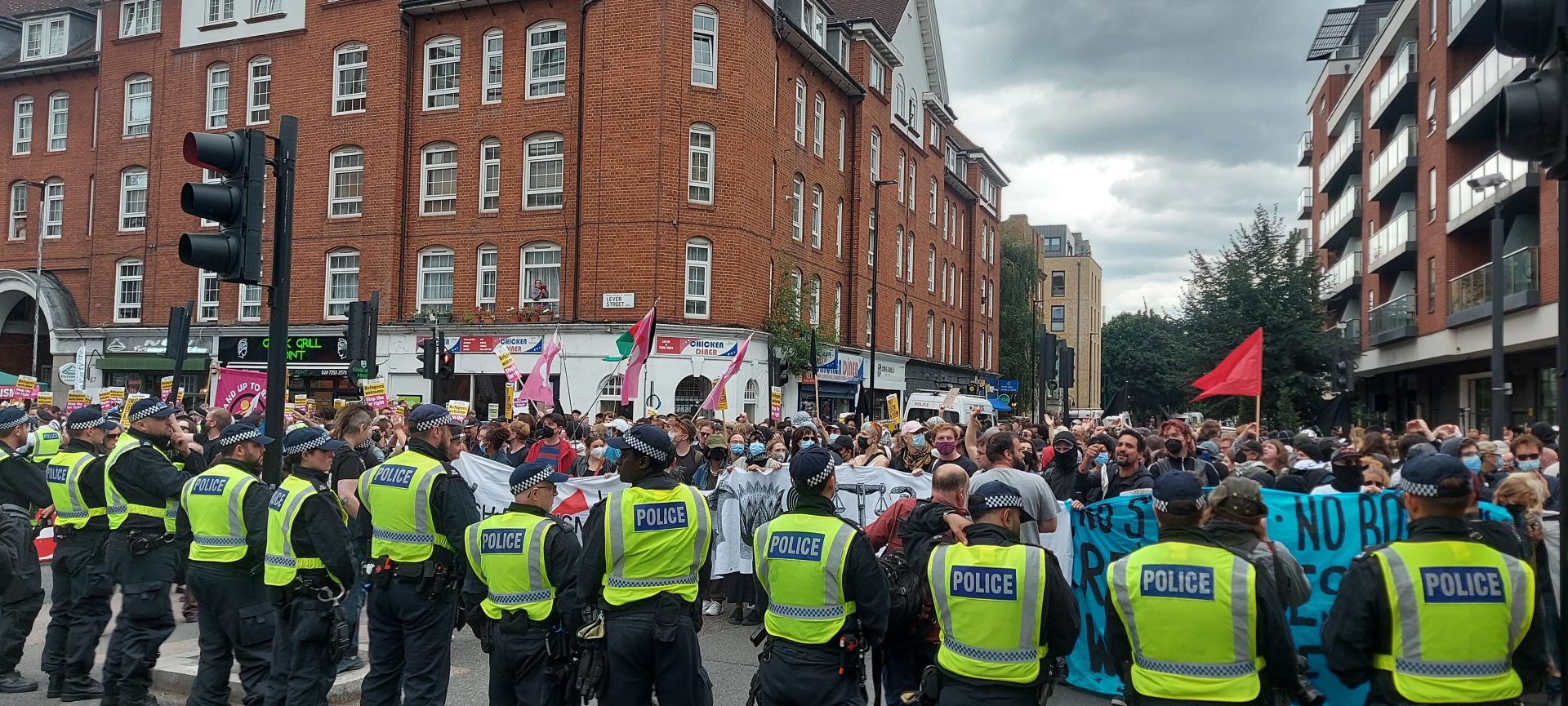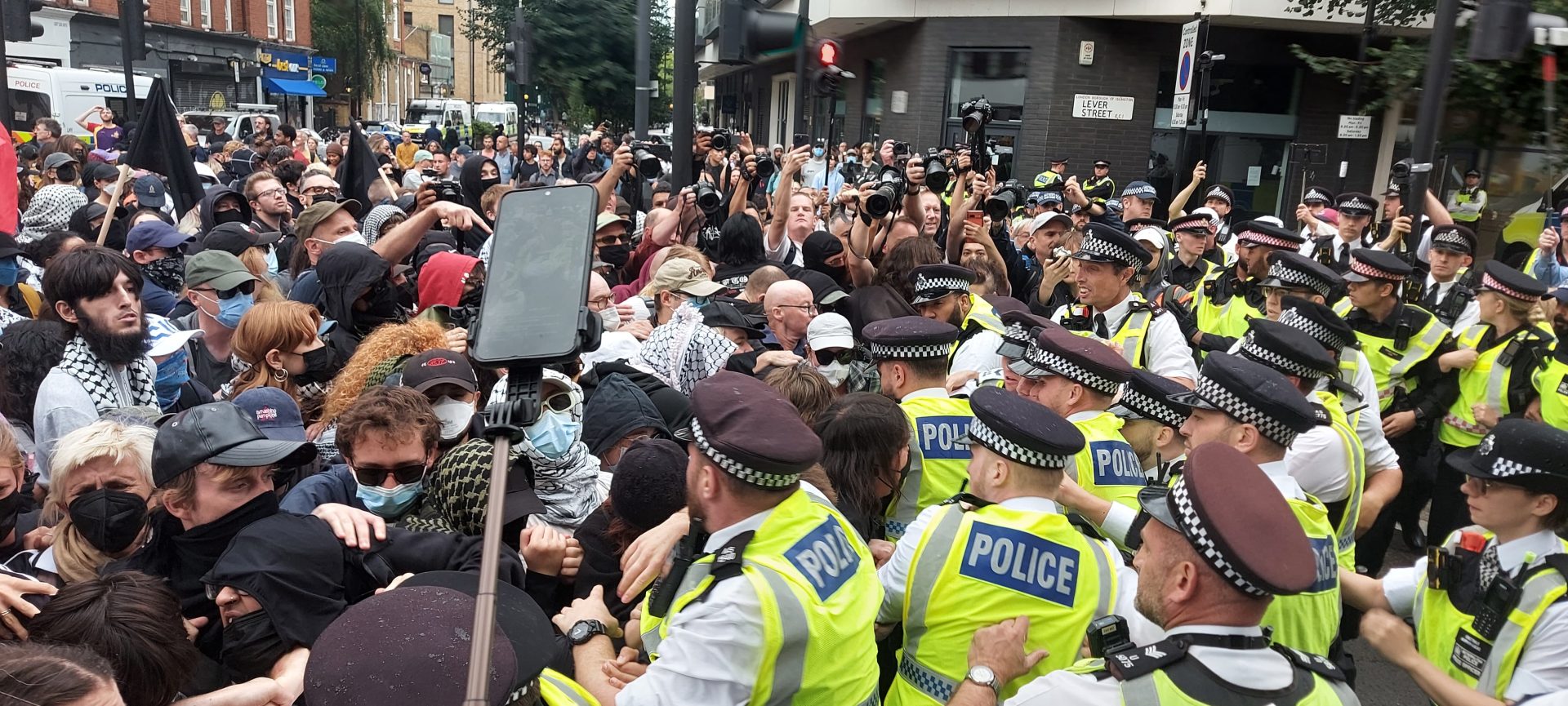Barbican, London
Britain’s anti-asylum seeker hotel protests escalated today as an unauthorized “antifascist” demonstration led to clashes with police. The original protest, organized by opponents of migrant housing at the Thistle City Barbican Hotel, remained peaceful. But tensions flared when a masked group in black suddenly flooded the road outside, clashing with police and prompting multiple arrests.
By 11am, locals were already gathering for the 1:30pm anti-migrant protest. A group of older women sitting at a table told me they were attending “because it’s not safe anymore”. Gesturing toward the hotel windows, where asylum seekers peered down at the scene below, one woman recalled, “Four years ago there was no problem when it was one to a room. Now there are too many.”
The Thistle City Hotel has drawn intense press and political attention in recent weeks. According to a Daily Mail report, 41 migrants staying in the accommodation have been charged with crimes. When this figure was repeated among the women, one of them snapped, “It’s two-tier,” before adding “if there are 41 bad eggs, that’s 41 too many”.
Initially, the anti-migrant protestors were met by a small group of pro-refugee activists from Stand Up to Racism (SUTR), who arrived chanting, “No barriers, no nations, stop deportations”. A speaker from Finsbury Park Mosque addressed the crowd from a stage, declaring: “Refugees are not the cause of our problems”.
Among those supporting the counter-protest was Methodist Minister Steven Cooper, who said he had been disturbed by what he described as “far-Right activity” in nearby Epping. He acknowledged that migrants often face difficulties “adjusting to different cultural expectations,” but stressed that “is not a basis for hatred.” Cooper also criticized the tone of his own side’s demonstration, calling it “unhelpful” and “a far-left instinct reacting to a far-right instinct.”
At this point the situation began to escalate. Down a side street, a black-clad column of over a 100 masked individuals began marching towards the protest. They refused to speak to journalists and were not part of the authorized counter-demonstration. Police rushed to block their path, but the group quickly occupied the road, forming a dense crowd that proved difficult to disperse. Officers began making arrests in groups of 10, targeting the most visibly aggressive.
Dressed in black with a sprinkling of trans symbols and keffiyehs, they sang “this is what community looks like” as they resisted arrest and threw water at police officers. The activists waved black flags and displayed a sign which read “the enemy doesn’t arrive by boat, he drives by limousine”.

Some from the original SUTR protest peeled off to join the new formation. “It’s normal to support people seeking refuge,” one young woman told me amid the confusion. Her remarks were met with shouts from the other side: “You’re not from here”.
Eventually, police reinforcements arrived and the masked group was moved into the permitted protest area. But by then the dynamic had changed. One officer told me there were “a few hundred” police on duty that morning — a number that grew as forces were deployed from across London in response to the black-clad group’s arrival.
As some asylum seekers waved from the hotel windows, I remembered a conversation I’d had earlier that day with a young mother. She described the current situation as “not sustainable,” complained that the men inside “don’t behave,” and added: “The government has to sort it out”.
That same ambivalence was present throughout the day: among the older women at the protest, the minister uncomfortable with his own side’s slogans, and the local father watching from a distance. As I left, a young mother told me: “I’m scared this will cause a race riot”.











Join the discussion
Join like minded readers that support our journalism by becoming a paid subscriber
To join the discussion in the comments, become a paid subscriber.
Join like minded readers that support our journalism, read unlimited articles and enjoy other subscriber-only benefits.
Subscribe